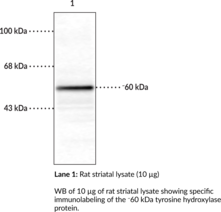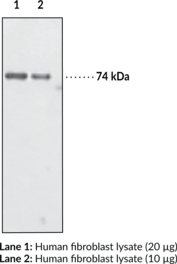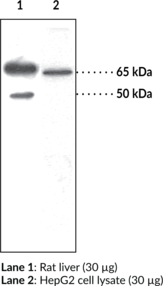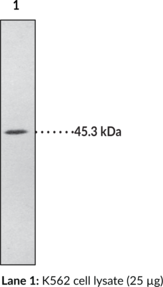Description
Tyrosine hydroxylase (TH) catalyzes the conversion of tyrosine to L-DOPA, which is the rate-limiting step in the biosynthesis of the catecholamines dopamine, norepinephrine, and epinephrine.{56214} It assembles into tetramers, with each monomer comprised of an N-terminal regulatory domain with three serine residues at positions 19, 31, and 40 that are subject to regulatory phosphorylation, a central catalytic domain, and a C-terminal tetramerization domain. TH is expressed in dopaminergic neurons in the olfactory bulb, diencephalon, substantia nigra, ventral tegmental area, and retinal amacrine cells, adrenergic and noradrenergic cells in the hypothalamus, medulla, and locus coeruleus (LC), as well as sympathetic ganglia and adrenal chromaffin cells. Due to its expression in catecholaminergic neurons, TH has been used as a marker of these cells in the brain.{56215} Mutations in TH have been found in patients with tyrosine hydroxylase deficiency, infantile parkinsonism, and progressive infantile encephalopathy.{56216,56217} Cayman’s Tyrosine Hydroxylase (rat, native) Polyclonal Antibody can be used for immunocytochemistry (ICC), immunohistochemistry (IHC), and Western blot (WB) applications. The antibody recognizes TH at approximately 60 kDa from human, mouse, rabbit, and rat samples.
Synonyms: TH|Tyrosine 3-hydroxylase|Tyrosine 3-monooxygenase
Immunogen: Native rat tyrosine hydroxylase purified from pheochromocytoma
Formulation: 100 µl affinity-purified polyclonal antibody from pooled serum
Isotype:
Applications: ICC, IHC, WB
Origin:
Stability: 365 days
Application|Immunocytochemistry||Application|Immunohistochemistry||Application|Western Blot||Product Type|Antibodies|Polyclonal Antibodies||Research Area|Neuroscience|Neurodegenerative Disorders|Parkinson’s Disease




